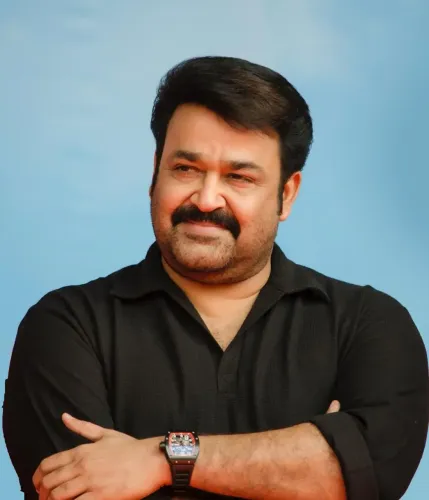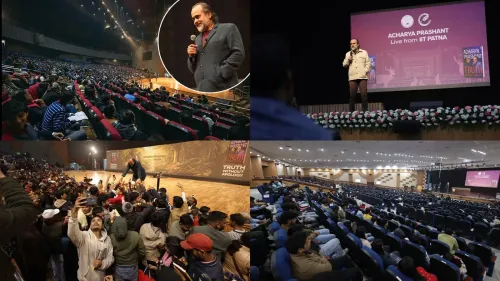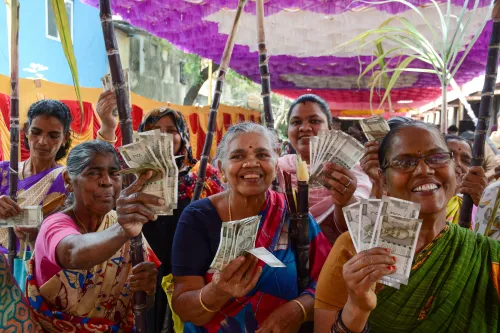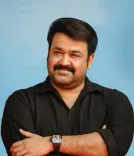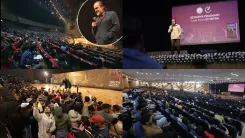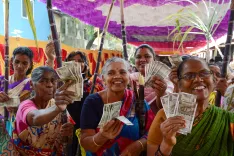Shashi Tharoor Explores India’s Soft Power at Dr. L.M. Singhvi Memorial Lecture
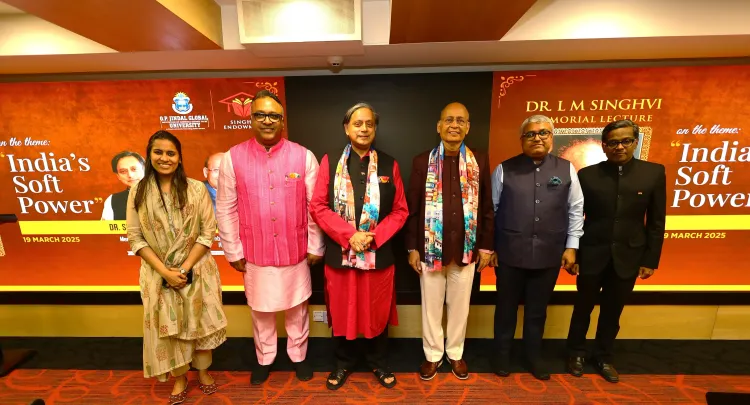
Synopsis
Key Takeaways
- India's soft power is vital for global influence.
- Multi-alignment enhances diplomatic engagement.
- Bollywood reshapes global perceptions.
- Yoga symbolizes India's cultural heritage.
- Vaccine diplomacy showcases leadership.
- India's space program fosters international collaboration.
- Soft power relies on persuasion over coercion.
- India's diversity management serves as a global model.
New Delhi, March 21 (NationPress) Dr. Shashi Tharoor, a Member of Parliament in the Lok Sabha, presented the 10th Dr. L.M. Singhvi Memorial Lecture focusing on the topic of 'India’s Soft Power'. He articulated that “Soft power projects multi-alignment, creating a network of interconnected influences where collaboration is essential. This multi-alignment enables India to adeptly navigate a networked world, engaging with various coalitions and platforms that fulfill distinct goals, thereby showcasing India's significant global role and its commitment to universal principles.
The Dr. L.M. Singhvi Memorial Lecture is an annual event organized by Jindal Global Law School, O.P. Jindal Global University, in memory of Dr. L.M. Singhvi, a notable figure and esteemed jurist who made substantial contributions as a statesman, diplomat, author, and lawyer. The lecture was conducted under the auspices of the Singhvi Endowment, established by Dr. Abhishek Manu Singhvi, son of the late Dr. L.M. Singhvi and a Senior Advocate in the Supreme Court of India, as a tribute to his father.
During the lecture, Dr. Tharoor elaborated on the essence of soft power, stating, “Soft power encompasses the influence a nation holds beyond its military strength. It is rooted in three primary resources: its culture, its political values when upheld both domestically and internationally, and its foreign policies perceived as legitimate and morally authoritative. Soft power reflects the public perception of a country, while hard power relates to direct confrontation. In the contemporary landscape, soft power emerges as a pivotal element in geopolitical strategies embraced globally.
Highlighting India’s soft power, Dr. Tharoor remarked, “As influence increasingly transitions from military and economic dominance to cultural and intellectual leadership, India’s soft power is a vital asset. We represent a vision of India that transcends geographic boundaries. Our multicultural, multi-ethnic, multi-party, and pluralistic democracy captivates many, particularly our parliamentary structures, the conduct of free and fair elections, and our engagement with civil society in pursuit of inclusive growth.”
“On International Yoga Day, as millions worldwide unroll their yoga mats, it symbolizes a tradition that merges ancient wisdom with modern wellness. This cultural gift from India exemplifies balance. India’s advocacy for yoga on a global scale, culminating in the UN's near-unanimous acknowledgment of International Yoga Day, serves as a powerful testament to India’s role in fostering global harmony,” he explained.
Commenting on Bollywood’s influence as a critical component of Indian soft power, Dr. Tharoor stated, “Bollywood not only celebrates the vibrancy of Indian cinema but also solidifies its role as a significant instrument of Indian soft power, weaving India’s spirit into the global consciousness. The international success of Indian cinema has positioned Bollywood as a formidable element of our soft power, reshaping global perceptions and broadening India’s cultural presence on the world stage.”
Regarding other dimensions of India’s soft power, Dr. Tharoor noted, “India's aspiration for global leadership in the 21st century is rooted in the appealing aspects and products of its culture and society. The origins of India's soft power are profound, as we are a civilization with a rich history spanning millennia. The esteem India commands globally stems from its ability to exemplify successful diversity management despite challenges, which reflects India's core identity. It acts as a subtle force, fostering goodwill and bridging divides—unlike coercive measures, soft power thrives on persuasion. India’s vaccine diplomacy during the COVID crisis exemplifies leadership marked by responsibility and solidarity. Furthermore, India’s prowess in space exploration has opened new avenues for international cooperation, inviting the global community to share in its aspirations for a collective future among the stars, establishing India as a key player in shaping the global space order.
Dr. Abhishek Singhvi, a member of the Rajya Sabha and Senior Advocate in the Supreme Court, reminisced about his esteemed father, stating, “He [Dr. L.M. Singhvi] was a renaissance figure, multifaceted and vibrant. A true renaissance individual is one who masters many disciplines. His diplomatic career in the UK reached great heights, complemented by his illustrious legal career, which he willingly set aside when he assumed the role of High Commissioner. He was the visionary behind Law Day, now recognized as Constitution Day, and played a pivotal role in the diaspora movement with his comprehensive report on Pravasi Bhartiya. He introduced the terms Lokpal and Lokayukta in the 1960s and tirelessly worked for their implementation in our political framework. He authored the report that led to the 73rd and 74th constitutional amendments in Panchayati Raj, revolutionizing local self-governance. As a Member of Parliament, he believed in and practiced cross-party generosity and magnanimity, avoiding the narrow confines of divisiveness and mistrust.”
In his opening address, Professor (Dr) C. Raj Kumar, Founding Vice Chancellor of O.P. Jindal Global University, celebrated Dr. L.M. Singhvi’s legacy, describing him as India's VIBGYOR Man, capturing the multifaceted nature of his character. His contributions span numerous public life areas, and he remains one of India's foremost public intellectuals. He also expressed gratitude to Dr. Abhishek Singhvi for establishing this endowment in memory of his father, providing an opportunity to honor one of India’s eminent jurists.
Professor (Dr) S.G. Sreejith, Executive Dean, Strategy & Institution Building at Jindal Global Law School, remarked that Jindal Global Law School is privileged to receive this endowment. “Dr. L.M. Singhvi was not merely a diplomat, statesman, and scholar—he had profound faith in the law's power, especially international law, as a universalizing force. To honor this vision, Jindal Global Law School conducts the annual Dr. L.M. Singhvi International Conference on International Law and International Relations, along with the Dr. Singhvi Memorial Lectures, celebrating his insights into the intersections of international law and politics.”
Professor Dabiru Sridhar Patnaik, Registrar of O.P. Jindal Global University, delivered the concluding remarks.


